PREVIOUS
SDG Goal wise programs of India – Part 08
November 27 , 2024
135 days
662
0
SDG Goal wise programs of India – Part 08
(இதன் தமிழ் வடிவத்திற்கு இங்கே சொடுக்கவும்)
Mission for Integrated Development of Horticulture (MIDH)
Launched:
- In 2014.
- The mission focuses on the integrated development of the horticulture sector in India, including crops like vegetables, fruits, aromatic plants, spices, bamboo, cashew, coconut, and cocoa.
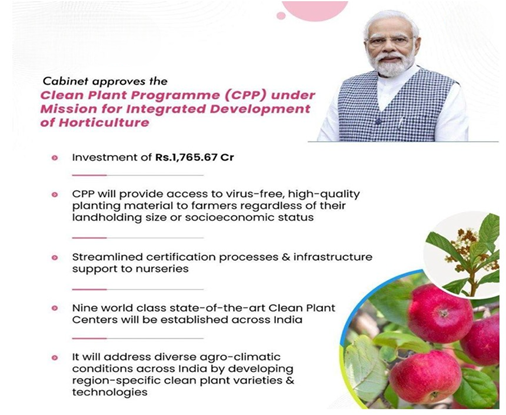
Ministry or Nodal Agency:
- The Ministry of Agriculture and Farmers’ Welfare, Government of India is the nodal agency for MIDH.
Objectives of MIDH:
- The major goals of MIDH are aimed at the holistic development of the horticulture sector and improving the livelihoods of farmers.
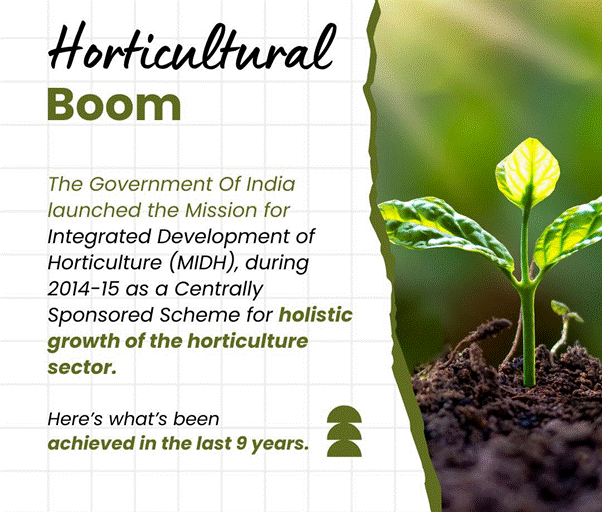
The key objectives include:
- Promoting horticulture growth: Enhance production, quality, and productivity in the horticulture sector.
- Aggregation of farmers: Encourage the formation of Farmer Producer Organizations (FPOs), Farmer Interest Groups (FIGs), and Farmer Producer Companies (FPCs) to achieve economies of scale, augment production, and improve profitability.
- Boosting income and nutritional security: Increasing the income of the farmers and contributing to national nutritional security.
- Improving productivity: Enhance productivity through quality planting material, better soil health, and micro-irrigation techniques.
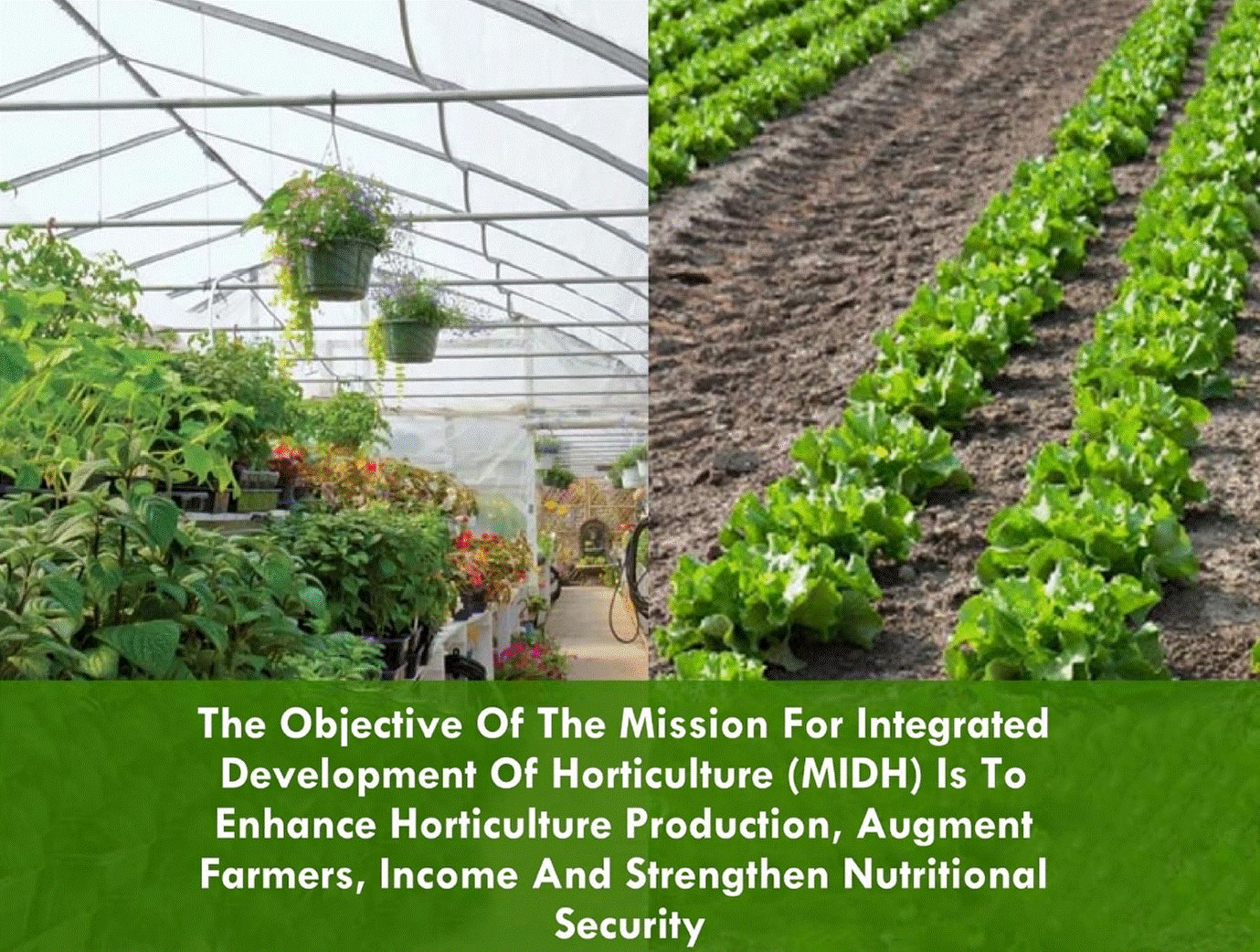
- Skill development and employment generation: To develop human resources, generate employment, particularly for rural youth, in sectors like horticulture, post-harvest management, and the cold chain industry.
- Technology adoption: Promote the adoption of improved technologies and practices in farming to enhance overall productivity and sustainability.
- Training and capacity building: Improve farmer knowledge and skills through institutions such as Krishi Vigyan Kendras (KVKs) and state agricultural universities.
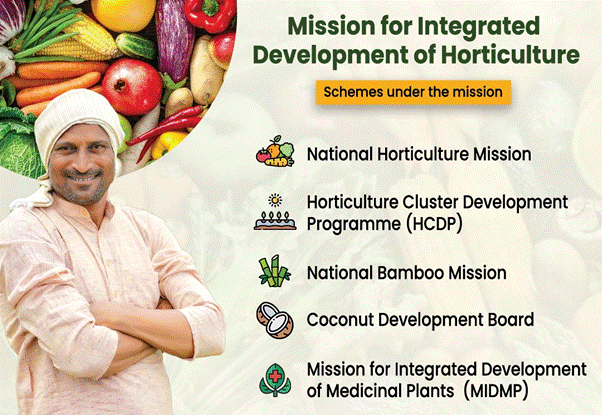
Sub-Schemes Under MIDH:
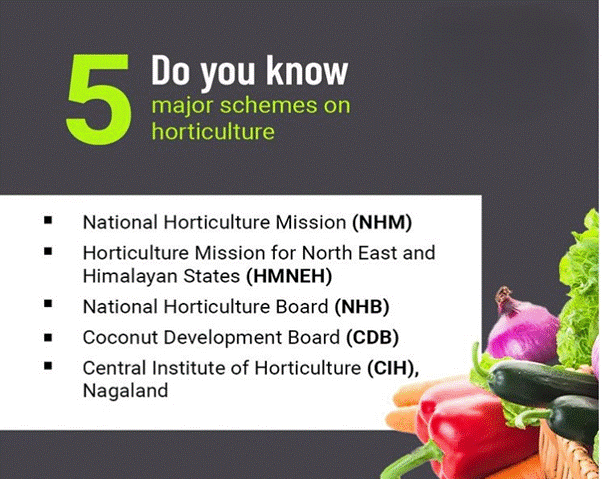
- National Horticulture Mission (NHM):
- Focuses on increasing production and productivity in the horticulture sector, particularly in non-hill states.
- Implemented by State Horticulture Missions.
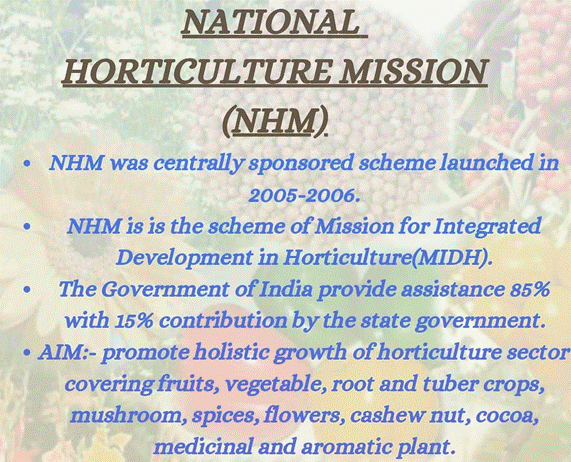
- National Horticulture Board (NHB):
- Implements MIDH schemes at the state and Union Territory levels, primarily focusing on the development of commercial horticulture.
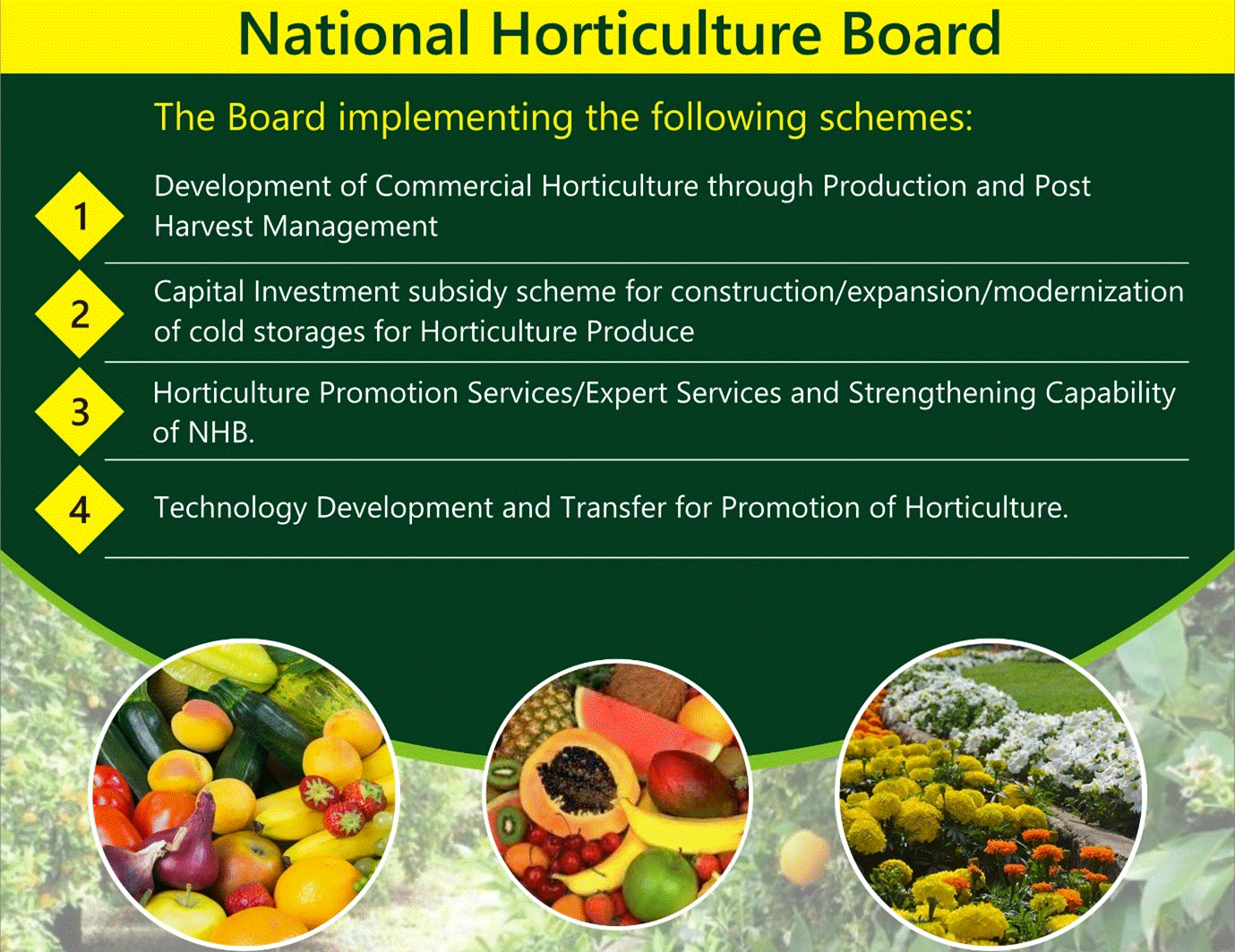
- Horticulture Mission for North East & Himalayan States (HMNEH):
- Specifically designed for the North Eastern and Himalayan states to promote horticulture in these regions.
- Coconut Development Board (CDB):
- Implements MIDH schemes in coconut-growing regions, aiming to improve coconut production and quality.

- Central Institute for Horticulture (CIH), Nagaland:
- Established to provide technical support and capacity-building in the Northeastern region, supporting farmers with training and resources.
- National Bamboo Mission (NBM):
- Promotes the cultivation and marketing of bamboo as a high-value horticultural crop.
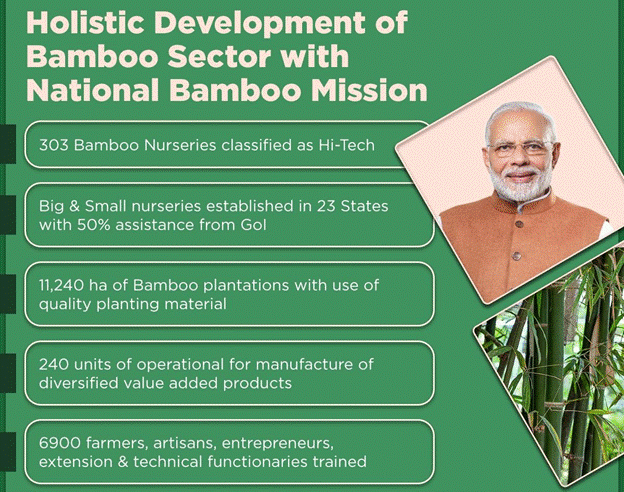
Strategies of MIDH:
- Comprehensive Approach: An end-to-end strategy covering all stages from pre-production to marketing, including post-harvest management, processing, and market access.
- Promotion of R&D: Encourages research and development in horticultural practices, post-harvest management, and cold chain infrastructure to increase the shelf life of perishable products.
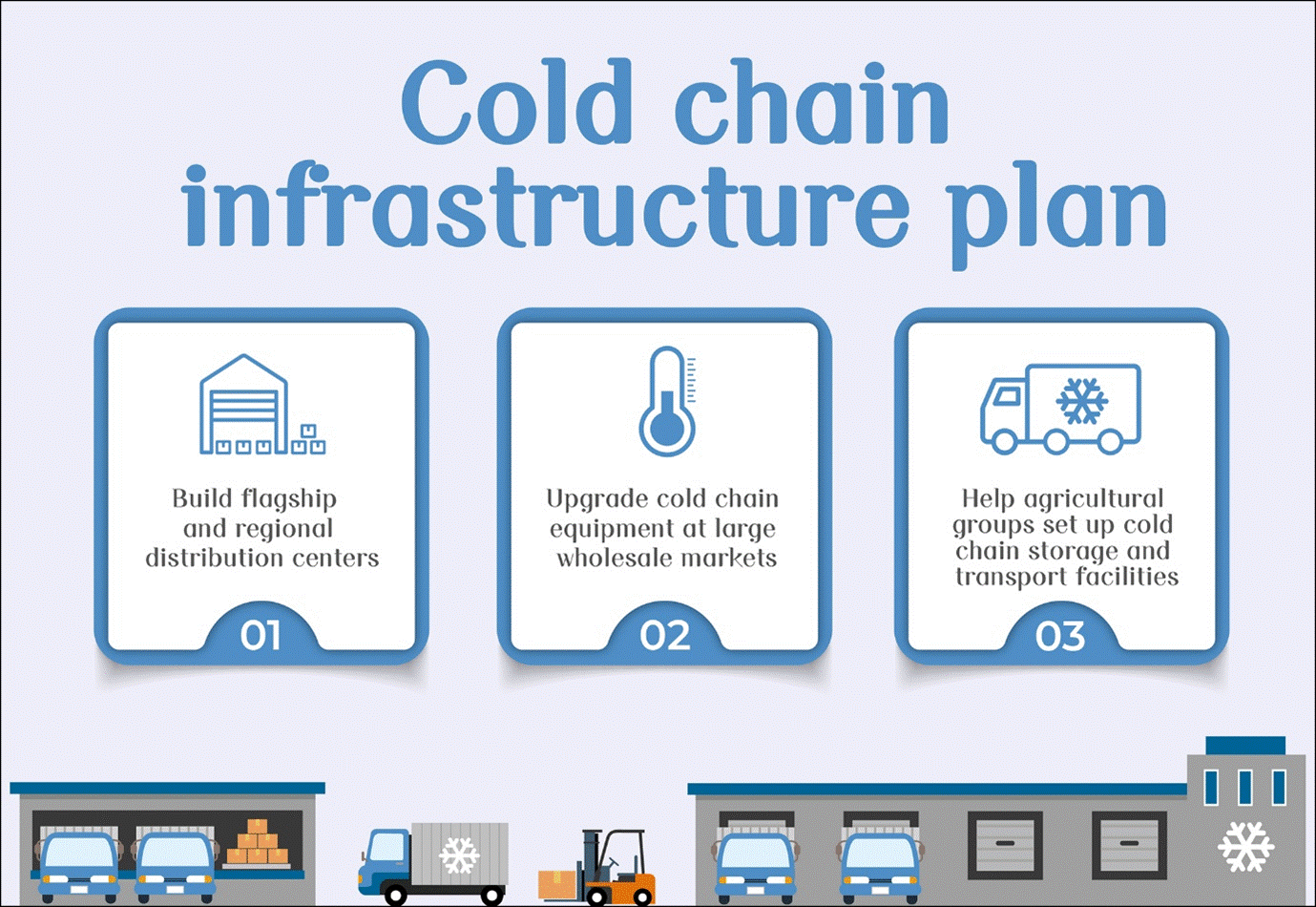
- Diversification: Promotes the diversification of crops from traditional varieties to high-value crops like vineyards, orchards, and flower plantations.
- Technology Extension: Focus on the extension of high-tech horticulture, including protected cultivation, precision farming, and micro-irrigation systems.
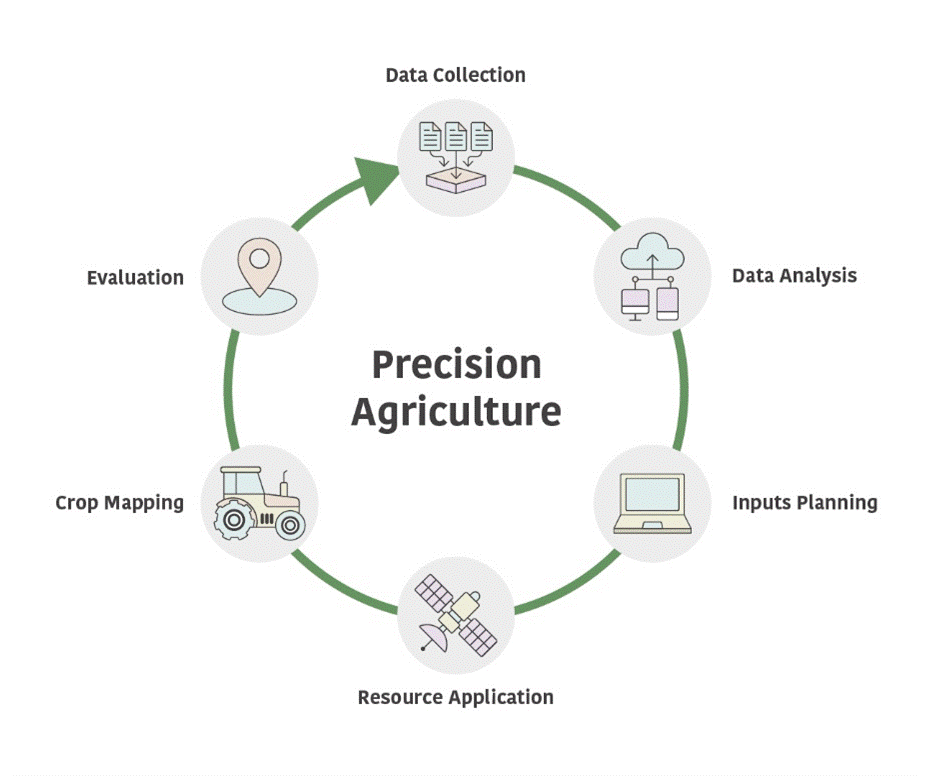
- Collaborative Approach: Encourages coordination and partnerships between various stakeholders - R&D institutions, processing agencies, market aggregators, and financial institutions.
- Farmer Producer Organizations (FPOs): Strengthens FPOs to help farmers improve market access and achieve better returns on their produce.
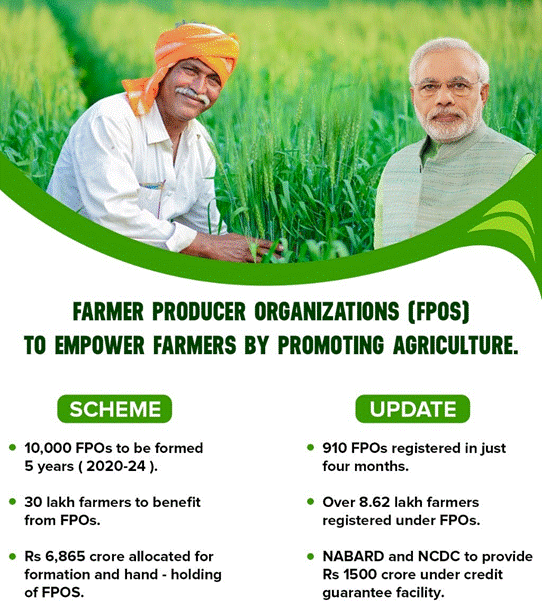
Key Activities Under MIDH:
- MIDH supports a wide array of activities designed to improve horticulture production and sustainability.
- Establishment of nurseries: To produce quality planting material through tissue culture.
- Area Expansion: Setting up new orchards and rejuvenating unproductive and old orchards.
- Protected Cultivation: Promotion of polyhouses, greenhouses, and other protected cultivation methods to enhance productivity and grow off-season crops.
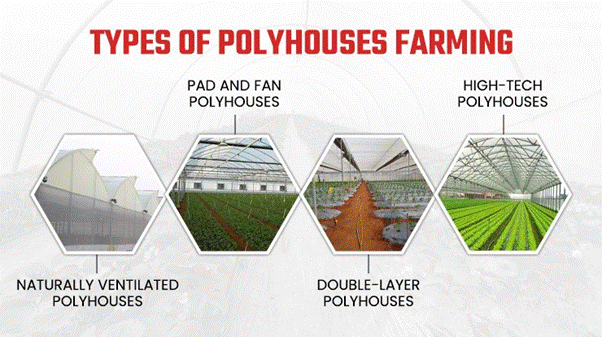
- Organic Farming: Promotion of organic farming practices and certification.
- Water Resources Development: Creation of irrigation systems and watershed management to improve water use efficiency.
- Beekeeping: To enhance pollination, especially in fruit and vegetable crops.
- Horticulture Mechanization: Promotion of mechanization to reduce labor costs and increase efficiency in horticultural practices.
- Post-Harvest Management: Establishing infrastructure for cold storage, packaging, processing, and marketing to reduce losses and add value to produce.
Eligibility Criteria:
- Farmers: Those cultivating fruits, vegetables, flowers, spices, and other horticultural crops.
- Farmer Producer Organizations (FPOs) and Farmer Producer Companies (FPCs): These groups are encouraged to take part in the aggregation of farmers and enhancing production and marketing.

- State Governments: State horticultural missions are the primary implementers of the scheme, with the support of various horticulture development boards and agencies.
- Private Stakeholders: Agri-businesses involved in processing, packaging, and marketing of horticultural products are also eligible for participation.
Benefits of MIDH:
- Improved Productivity: By promoting better farming practices, technology, and micro-irrigation systems, the scheme helps increase productivity and yield.
- Increased Income: Through aggregation and better marketing infrastructure, farmers can get higher returns and better prices for their produce.
- Employment Generation: The scheme encourages rural youth to participate in the cold chain industry, post-harvest management, and processing sectors, leading to job creation.
- Sustainability: By promoting organic farming, water conservation, and post-harvest management, the scheme ensures that horticultural practices are sustainable and environmentally friendly.
National Mission on Edible Oil-Oil Palm (NMEO-OP)
Launched:
- The National Mission on Edible Oil-Oil Palm (NMEO-OP) was approved by the Union Cabinet in August 2021, with the aim to increase domestic palm oil production and make India self-reliant in edible oils by 2025-26.
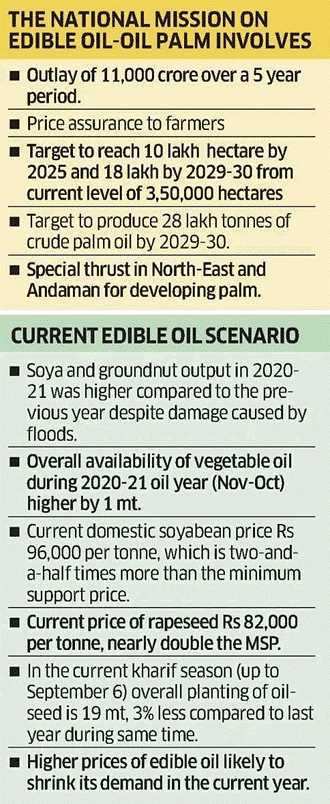
Ministry or Nodal Agency:
- The scheme is implemented under the Ministry of Agriculture and Farmers’ Welfare, Government of India.
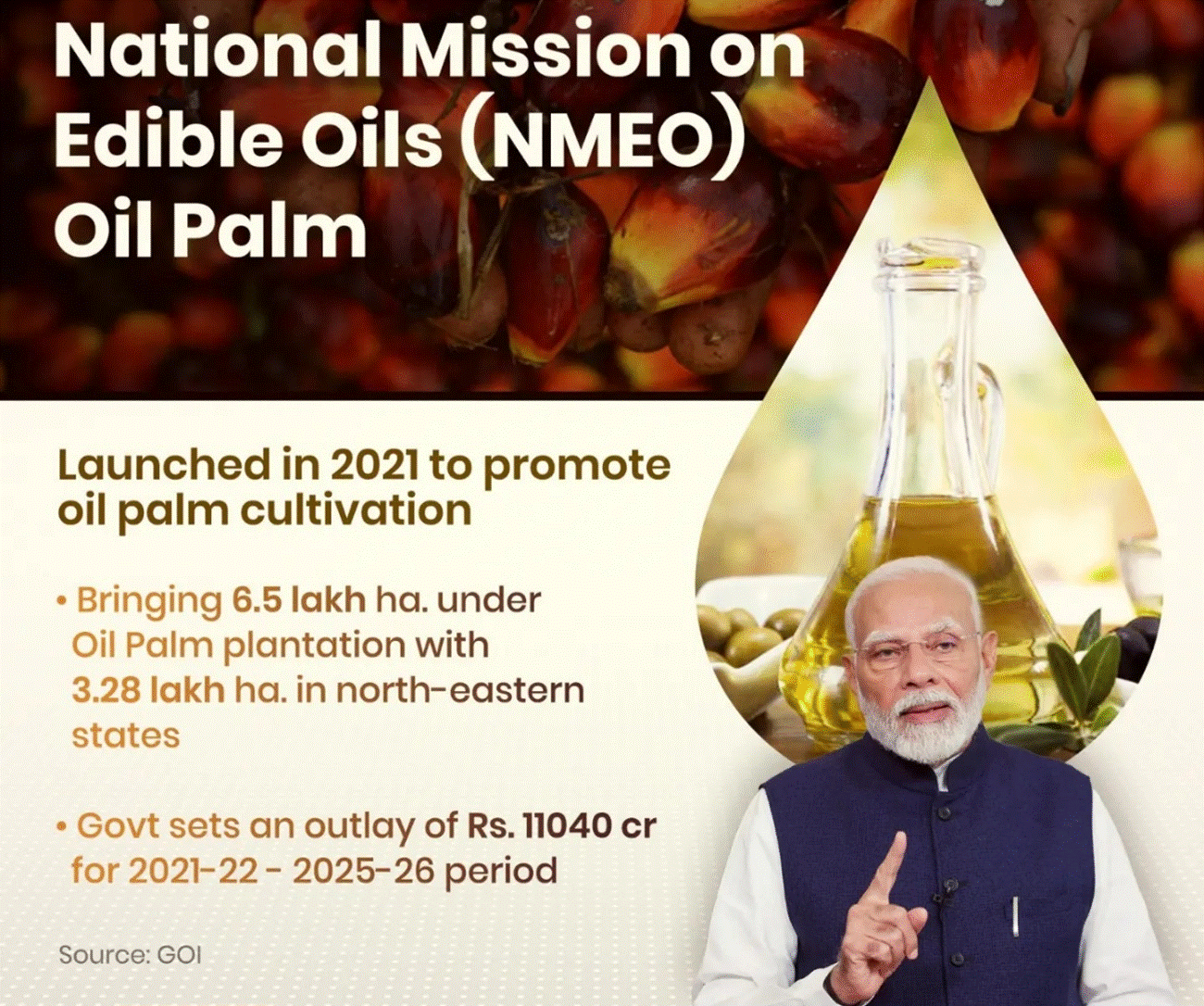
Objectives of NMEO-OP:
- The primary objectives of the National Mission on Edible Oil-Oil Palm (NMEO-OP) include:
- Self-Reliance in Edible Oils:
- The mission aims to significantly reduce India’s dependency on imported edible oils, especially palm oil, by promoting domestic cultivation.
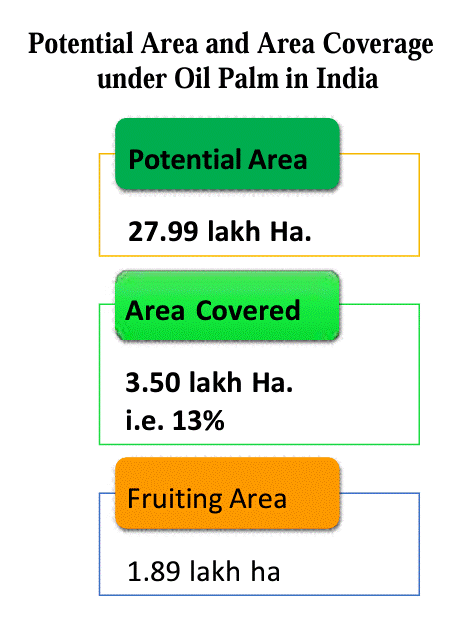
- Increase in Palm Oil Production:
- The goal is to increase the domestic production of palm oil from the current level to 11.20 lakh tonnes by 2025-26, and eventually to 28 lakh tonnes by 2029-30.
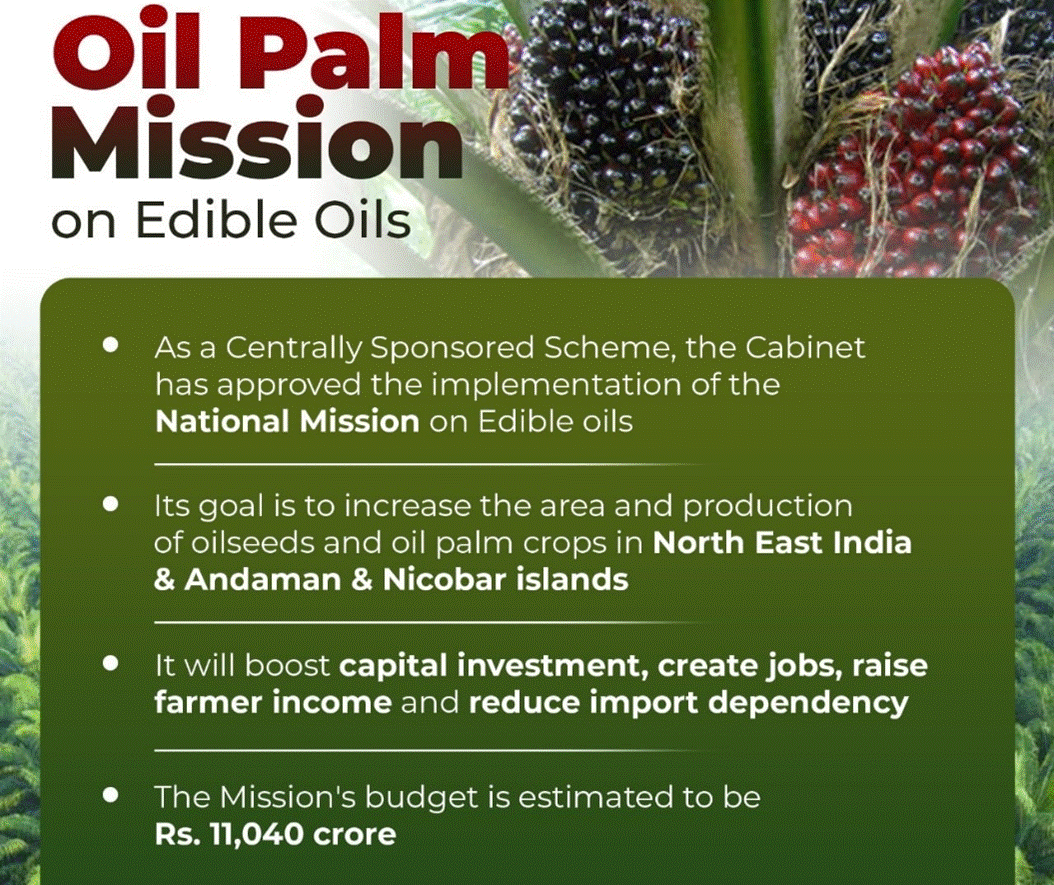
- Promote Palm Oil Cultivation:
- It focuses on expanding the area of palm oil cultivation in India, targeting an additional 6.5 lakh hectares by 2025-26, with the ultimate target of reaching 10 lakh hectares.
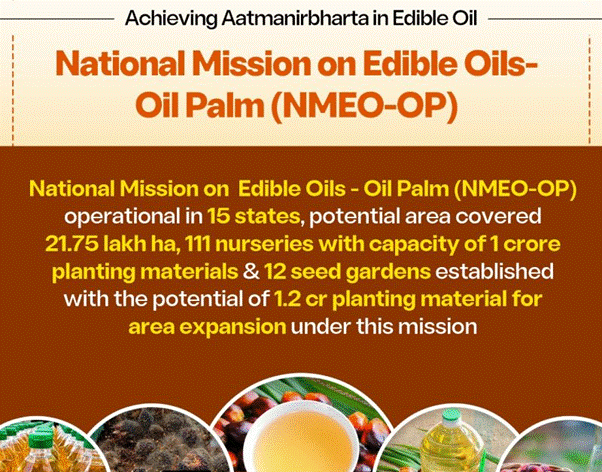
Addressing Price Volatility:
- The scheme introduces a Viability Price (VP) mechanism to provide price assurance to farmers, mitigating the risks associated with price fluctuations.
NMEO-OP Features:
- Price Assurance to Farmers:
- Farmers cultivating palm oil under the scheme will receive a price assurance mechanism, known as the Viability Price (VP).
- The VP is fixed at 14.3% of the annual average Crude Palm Oil (CPO) price of the last five years, adjusted for inflation using the Wholesale Price Index (WPI).
- The VP is set to increase to 15.3% in the future, offering protection against price volatility.
- The deficiency price will be paid directly to farmers via Direct Benefit Transfer (DBT).
- Special Assistance for NE & Andaman Regions:
- To support the Northeast and Andaman & Nicobar Islands, the government will bear an additional cost of 2% of the CPO price to ensure parity with the rest of the country.
- Input and Intervention Support:
- Special assistance for replanting old gardens and rejuvenating unproductive palms at a rate of Rs. 250 per plant.
- The government has increased assistance for planting material from Rs. 12,000 per hectare to Rs. 29,000 per hectare.
- Increased Support for Seed Gardens:
- Seed gardens in other states will receive up to Rs. 80 lakhs for 15 hectares, and in the North-Eastern and Andaman regions, the support is increased to Rs. 100 lakhs.
Significance of NMEO-OP:
- Self-Sufficiency in Edible Oils:
- India is the largest consumer of edible oils in the world, with edible oils being the third-largest import after crude oil and gold.
- The mission aims to reduce the dependency on palm oil imports, especially from Indonesia and Malaysia, by increasing domestic production.
- Projected Demand Growth:
- The demand for edible oils in India is expected to touch 20 million tonnes by 2030, driven by factors like changing food habits and rising disposable incomes.
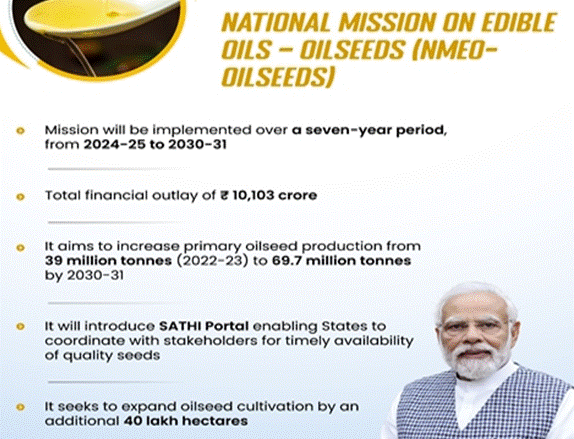
- Importance for the Food Industry:
- More than 94% of palm oil is used in the food industry, particularly for cooking.
- Strategic Importance:
- Given the rising prices of edible oils globally and the critical role of palm oil in India’s food sector, the NMEO-OP aligns with the Aatma Nirbhar Bharat initiative, promoting self-reliance in edible oil production.
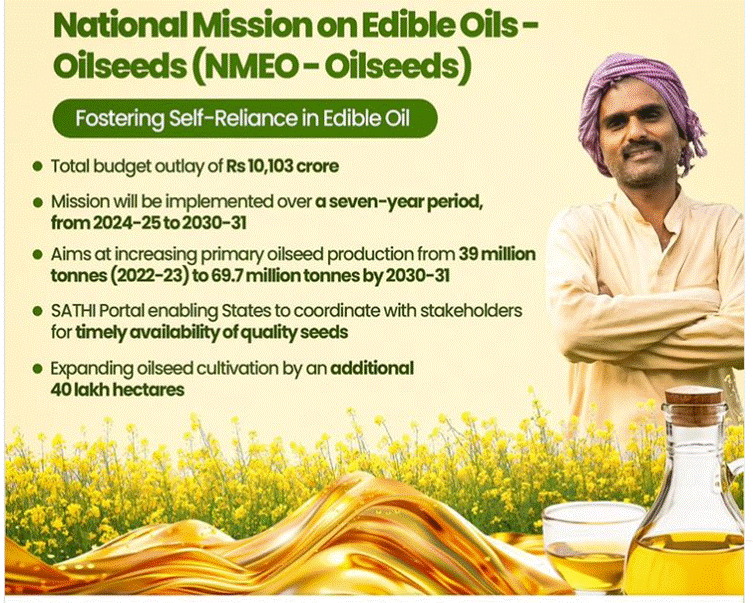
Beneficiaries of NMEO-OP:
- Farmers:
- Farmers cultivating palm oil, particularly in the North-Eastern states and Andaman & Nicobar Islands, will benefit from financial assistance, price assurance, and technical support for palm oil cultivation.
- State Governments:
- The mission will be implemented through State Horticulture Missions, which will coordinate with farmers and industries to establish palm oil plantations and processing units.
Eligibility Criteria:
- Farmers: All farmers cultivating oil palm in the identified regions (especially in the North-Eastern states and Andaman & Nicobar Islands) are eligible for benefits under the scheme.
Benefits of NMEO-OP:
- Increased Income for Farmers:
- The scheme provides a price support mechanism, protecting farmers from market volatility, and is expected to increase their income by promoting a profitable crop like palm oil.
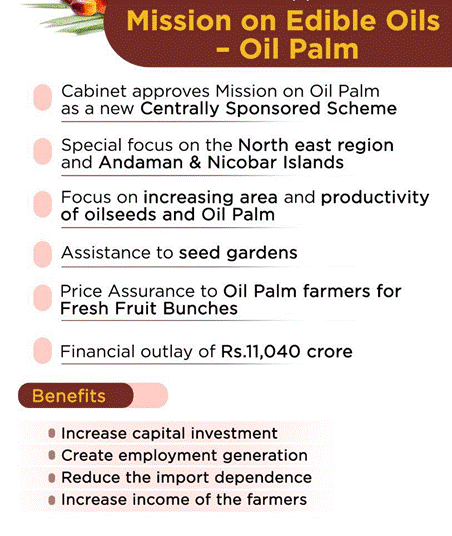
- Support for Palm Oil Cultivation:
- Farmers will receive financial support for purchasing planting material, replanting older gardens, and assistance for water management and intercropping.
- Infrastructure and Processing Support:
- The mission promotes the creation of processing units in the palm oil sector, creating employment opportunities and value-added products.
- Self-Reliance in Edible Oils:
- By increasing domestic palm oil production, the scheme aims to make India self-reliant and reduce dependence on imports, thus saving foreign exchange.
-------------------------------------
Leave a Reply
Your Comment is awaiting moderation.


